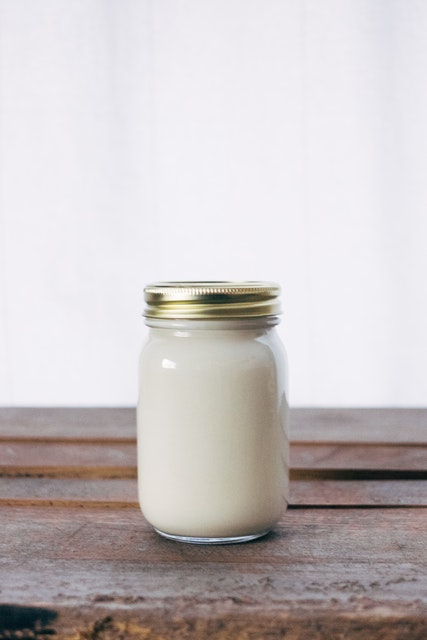When Can Babies Have Almond Milk?

Milk is often the drink of choice for most babies. However, if a parent is concerned about any allergies, they may opt for plant-based milk such as almond or soy milk. Our focus today is going to be on almond milk, and when can babies have almond milk.

What is Almond milk?
Almond milk, just as its name suggests, is made from almonds. Almonds are wonder nuts that contain monosaturated fatty acids good for humans. To make almond milk, the nuts are soaked in water the crush them resulting in a milky white liquid.
Depending on the brand you choose, the nutritional value of almond milk varies. Some brand will add sugars and flavours, and others will not add anything. Therefore, this interferes with the nutrient components.
Almond milk for babies
The recommendation by most pediatricians is children below the age of one should breastfeed. If for some reason this is not possible, a parent can opt for infant formula.
Experts advise the introduction of another type of milk should only take place after the toddler turns one. The reason being there are nutrients in formula and breast milk, which are paramount for the development of a child.
Even if you opt to give your baby almond milk, you have to note this is not a replacement for formula or breast milk. Almond milk does not have the needed nutrients to help in healthy child development.
In some situations, almond milk can be a healthy replacement for cow milk. But, when making the switch, you have to note there is some nutritional difference.
It is best to talk to a pediatrician about the difference before you choose to make the switch.
Is Almond Milk Safe For Babies?
In case your child is lactose –intolerant, you might opt to give them almond milk. It is also an ideal option if you are avoiding dairy for other personal reasons.
However, kids who take almond milk might miss out on some vital nutrients needed for growth.
For parents who opt to give their babies almond milk, they can choose to feed them once or twice in 24 hours. This should be between breastfeeding and eating their meals.
In case you choose to get almond milk for babies. You have to ensure that:
- Get one which has low sugar or better yet, unsweetened
- The brand you pick must have Vitamin A, Vitamin D, and calcium
- The baby has other forms of protein and fat included in their diet
Your pediatrician will let you know about the added ingredients in the milk, like the thickeners and flavourings.
Inquire about the baby’s reaction to nuts. If you have family members with nut allergies, avoid introducing almond milk to your baby. The last thing you want when feeding your baby milk is to get an allergic reaction.

When Can Babies Have Almond Milk?
According to experts, babies should not have almond milk. If your baby is below a year, it is advisable to stick to only breastfeeding or baby formula.
According to the American Academy of Pediatrics (AAP), even children over the age of 1 year should drink cow’s milk only.
Further to this, the health organization recommends that children should not substitute cow milk for plant-based kinds of milk until they are over 5 years of age.
However, there can be exceptions to this if your baby is over 1 year and is lactose intolerant. If that is the case, you can substitute with plant-based milk after you have consulted with a pediatrician.
When Can Babies Drink Almond Milk?
Given the fact that almond milk has a low concentration of fats and vitamins, you should give the milk after meals. This is the right time since if you offer it before meals, it might make the baby feel satisfied.
It is vital to make sure your toddler has taken a well-balanced meal before you give them the milk.
That way, you will be sure your child is not missing out on important nutrients and vitamins. This can be achieved when your baby eats a balanced meal.
How much almond milk should babies take?
When your baby attains one year, they should not consume over 24 ounces of milk (this is apart from breast milk.).
The reason is babies over one year need to get most of the nutrients from eating balanced diets.
It does not benefit your young one if you fill them up with liquids that do not have the required nutritional value for their little bodies.
In as much as you will be giving almond milk, make sure they also eat a balanced diet.

Almond milk vs cow’s milk
Before you decide to give your baby almond milk, you need to know its nutritional value. Generally, cows’ milk is more nutritious than almond milk and any other plant-based milk.
That is why is highly recommended that you give your toddler cow milk. Let’s compare cow’s milk vs. almond milk for babies.
Proteins
Most people assume since almonds are nuts, they are packed with protein. Though this is the case, almond milk is made with its most significant component being water.
One cup of almond milk contains 0 grams of protein. However, 1 cup of cow’s milk contains 8g of proteins
Calories
Almond products have half calories of the calories compared to those found in whole milk. This is the reason the product is popular in adults looking to lose weight.
However, for babies to grow, they need plenty of calories.
Before you decide to give your child almond milk, make sure you understand the nutritional value they will be getting.
Conclusion
As a parent, you want to give your child the best. Though this is the case, you will find contradicting information from the internet as well as from family and friends.
In case you are on edge about giving almond milk to your baby, it is best to understand as long as your child is past their first birthday, they can take one or two servings of almond milk.
Should you choose to substitute almond milk, go for brands that are fortified with calcium.
Keep off brands that have added sugars or any sweeteners. When wondering when can babies have almond milk, consider the health benefits it will have on your baby, then go from there.
RECENT POSTS
